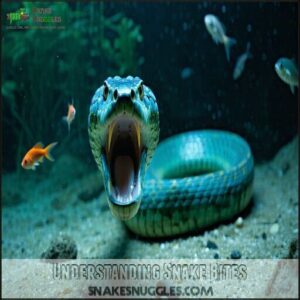This site is supported by our readers. We may earn a commission, at no cost to you, if you purchase through links.
 Yes, snakes can bite underwater, and they’re surprisingly good at it.
Yes, snakes can bite underwater, and they’re surprisingly good at it.
Aquatic species like sea snakes and water moccansins often bite while submerged, especially if they’re startled or defending themselves.
Even land-based snakes, like rattlesnakes, can bite underwater if provoked while swimming.
These bites can be venomous and dangerous, so staying calm and giving them space is your best bet.
Snakes use their fangs to deliver venom efficiently, even underwater—think of it like nature’s syringe in action.
Curious about how to avoid unwanted encounters or what to do if bitten? Stick around for tips that might just save the day.
Table Of Contents
- Key Takeaways
- Can Snakes Bite Underwater?
- Which Snake Species Can Bite Underwater?
- Underwater Snake Behavior
- Understanding Snake Bites
- Snake Safety Tips
- Frequently Asked Questions (FAQs)
- Can a snake bite you if you’re underwater?
- Do water snakes bite?
- What snakes bite you underwater?
- Can snakes open their mouths underwater?
- Do snakes swim underwater?
- Which snakes are found in water?
- Can a venomous snake bite underwater?
- Can a snake open its mouth underwater?
- Can copperheads bite you underwater?
- Do poisonous snakes swim under water?
- Conclusion
Key Takeaways
- Snakes can bite underwater, and their venom is just as effective as on land, thanks to specialized mouth seals that prevent water intake during a strike.
- Aquatic snakes like water moccasins, sea snakes, and even land-based swimmers like rattlesnakes are capable of delivering underwater bites.
- To stay safe, avoid areas with thick vegetation or murky water where snakes might be hiding, and move slowly to avoid provoking them.
- If bitten, stay calm, exit the water carefully, and seek immediate medical attention to manage venom effects and infection risks.
Can Snakes Bite Underwater?
Yes, snakes can absolutely bite underwater. Gliding silently beneath the surface, these reptiles retain their striking capabilities with remarkable efficiency underwater.
When submerged, snakes employ specialized underwater bite mechanics that allow them to deliver bites with nearly the same force as on land. Their unique snake mouth seal prevents water from diluting venom during delivery, ensuring the full potency reaches their target.
You’re most vulnerable to an underwater bite when accidentally disturbing aquatic snakes in their habitat. The defensive bite speed of a startled water snake can be surprisingly quick, despite water resistance.
Fishermen handling nets report more encounters than swimmers, as they often disrupt hidden snakes. To stay safe, avoid areas with dense underwater vegetation where venomous snakes might lurk. Sea snakes’ venom is especially potent.
Most aquatic snakes aren’t seeking confrontation. Give them space, and they’ll typically swim away, allowing you to enjoy the water without incident.
Which Snake Species Can Bite Underwater?
You’ll find sea snakes, water moccasins, and rattlesnakes among the numerous species capable of delivering painful bites even while submerged.
Sea snakes, water moccasins, and rattlesnakes all strike underwater, proving they’re formidable predators even beneath the surface.
These underwater hunters have evolved specialized physical features that create watertight seals around their mouths, allowing them to strike effectively beneath the surface when threatened or hunting prey, utilizing their ability to deliver painful bites.
Water Moccasins
Water moccasins’ reputation as underwater biters is well-earned in the southeastern United States’ swamps and waterways.
These cottonmouths excel at delivering underwater bites when hunting fish or defending their territory. Their adaptations to aquatic environments make them particularly effective predators in their habitat.
If you’re exploring moccasin territory, learn to identify these venomous snakes by:
- Their distinctive white mouth lining (hence "cottonmouth") displayed when threatened
- Their thick, heavy bodies with triangular heads housing powerful venom glands
- Their tendency to float with most of their body visible on the water’s surface
Unlike popular myths suggest, they won’t chase you, but they won’t hesitate to defend themselves if you get too close, making them a formidable opponent in their natural habitat, with a reputation for being aggressive when threatened.
Rattlesnakes
Despite their preference for dry environments, rattlesnakes can definitely bite underwater when threatened.
These venomous reptiles are surprisingly capable swimmers who can remain submerged for up to 45 minutes while holding their breath.
If you encounter a rattlesnake while swimming, your safest strategy is to remain completely still until it moves away.
Though rattlesnake venom remains potent underwater, their strike speed is somewhat hampered by water resistance.
Their underwater hunting adaptations allow them to survive in various habitats, from deserts to areas near lakes and rivers, making them highly adaptable creatures.
Sea Snakes
Sea snakes represent the ultimate underwater evolution in the reptile world, perfectly adapted for life beneath the waves with specialized features for swimming, hunting, and yes—biting underwater.
Sea snakes are unmatched masters of the ocean, combining deadly venom with streamlined precision to thrive as underwater predators.
These aquatic snakes possess some of the most potent venom on earth, often several times stronger than their land-dwelling cousins. Their streamlined bodies and paddle-shaped tails enable efficient movement while hunting fish and eels in coral reefs.
If you’re diving in tropical waters where these venomous swimmers dwell, remember:
- Keep your distance – sea kraits and true seasnakes aren’t typically aggressive, but they’ll defend themselves if cornered
- Watch for distinctive coloration – many species have banded patterns that serve as a warning
- Move slowly – sudden movements might trigger their defensive instincts, potentially resulting in an underwater bite
Despite their fearsome reputation, sea snake conservation status is concerning, with some species facing habitat loss and overfishing.
Underwater Snake Behavior
You’ll be surprised to learn that many snake species can open their mouths and strike effectively underwater, using powerful muscles and specialized features that create a tight seal to prevent water intake.
When swimming, snakes employ S-shaped movements that allow them to navigate efficiently through water and maintain enough control to deliver defensive bites if they feel threatened, utilizing their ability to make defensive bites.
Swimming Habits
Now that we’ve explored which snake species can bite underwater, let’s look at how they actually move through aquatic environments.
Snakes glide through water using efficient S-shaped movements for aquatic locomotion. While all snakes can swim, water snakes have developed special adaptations for buoyancy control, trapping air in their lungs to maintain their desired depth.
Most prefer swimming near the surface, though their dive duration varies by species. Tail vibrations can also be used.
- Cottonmouths slice through murky swamps with surprising swimming speed
- Water snakes navigate between reeds with ribbon-like precision
- Sea snakes undulate through ocean currents with remarkable efficiency
- Aquatic snakes can quickly change direction underwater when hunting
Feeding Patterns
Beneath the surface, underwater bite mechanics of aquatic snakes reveal fascinating prey selection patterns.
These reptiles have mastered efficient hunting strategies that maximize their chances of success.
| Snake Type | Hunting Strategy | Preferred Meal |
|---|---|---|
| Water Moccasin | Silent ambush | Fish, frogs |
| Sea Snake | Active pursuit | Eels, small fish |
| Cottonmouth | Venom usage | Aquatic rodents |
When you’re sharing their habitat, don’t worry—they’re focused on their natural dietary adaptations, not you.
Their strike mechanics underwater may be slower than on land, but they’re still remarkably effective at catching their next meal.
Submersion Capabilities
Have you ever wondered how long these slippery predators can actually stay underwater while maintaining their ability to bite? Different snake species display fascinating submersion capabilities that directly impact their underwater bite potential.
When submerged, snakes demonstrate remarkable breath holding abilities:
- Sea snakes reign supreme, capable of staying underwater for 1.5-3.5 hours thanks to their skin’s ability to absorb oxygen
- Water snakes like cottonmouths can remain submerged for 20-30 minutes while maintaining strike distance
- Rattlesnakes can hold their breath underwater for up to 45 minutes, keeping their mouth seal intact
- All venomous water snakes retain full muscle power and venom delivery capabilities underwater
You’ll find that every snake species has different limitations underwater, but don’t be fooled—they can all deliver a snake bite beneath the surface. Their specialized adaptations guarantee they’re just as dangerous underwater as they’re on land, though they’ll eventually need to surface for air.
Understanding Snake Bites
You’ll discover that snakes can deliver potent bites underwater just as effectively as on land, with venom delivery systems that remain fully functional despite aquatic conditions.
When swimming, you’re actually encountering creatures that have evolved specialized mouth structures that create tight seals, preventing water intake while allowing them to strike with precision if they feel threatened, utilizing their ability to deliver venom in an effective manner.
Venom Types
After observing underwater snake behavior, you’ll want to understand what makes their bites so dangerous—their venom.
Snake venom comes in three deadly varieties:
- Neurotoxins block nerve signals, causing terrifying paralysis that can stop your breathing
- Cytotoxins destroy tissue cells, creating painful swelling that might make you wish you’d stayed on dry land
- Hemotoxins disrupt blood clotting, potentially turning your insides into a horror show.
Each venomous snake has its own specialized chemical cocktail.
Sea snakes pack neurotoxins up to 10 times stronger than their land-dwelling cousins.
Their underwater bite delivers these toxins through specialized fangs—nature’s perfect hypodermic needles.
Venom potency varies by species, with each perfectly adapted for their hunting needs.
Symptoms and Dangers
Nearly all venomous snake bites underwater trigger immediate and frightening symptoms.
You’ll experience intense pain and rapid swelling at the bite site, followed by potential nausea, dizziness, and breathing difficulties.
Sea snake venom effects are particularly dangerous, as their neurotoxins can cause paralysis within just hours.
Other serious complications include kidney failure, tissue death, and severe infection risks.
Even non-venomous underwater bites can introduce harmful bacteria, leading to infections.
Don’t gamble with your health—medical response time directly impacts your survival chances, as venom spreads quickly through your bloodstream.
Behavioral changes such as increased hiding or lethargy can also be a sign of envenomation.
Immediate Actions
If you’re bitten by a snake underwater, every second counts. Stay calm immediately—panicking increases your heart rate and speeds venom circulation through your body. Exit the water quickly but deliberately.
- Keep a snake bite first-aid kit accessible whenever swimming in snake-prone waters (it might seem paranoid until you need it!)
Seek medical attention right away, even if the underwater bite seems minor. Focus on limb immobilization by keeping the bitten area still and positioned below heart level. Remove clothing, jewelry, or wetsuit material near the wound as these can constrict swelling tissues.
Try to remember details for snake identification—color, pattern, size—but don’t risk another bite trying to capture or kill it. This information helps doctors select proper treatment.
While waiting for help, monitor for snake bite symptoms like swelling, pain, or breathing difficulties. Modern snake bite treatment relies on antivenom, not outdated methods like tourniquets or venom extraction.
Snake Safety Tips
The key to snake safety around water is maintaining safe distancing from our slippery friends.
When exploring snake territory, follow these essential practices:
- Scan before swimming – Always check waters for telltale ripples or shapes before diving in (your grandmother was right about looking before you leap!)
- Dress defensively – Protective gear like thick boots can be your best friend when wading through snake-prone areas
- Move like molasses – Calm behavior prevents startling snakes into defensive mode
If you do suffer an underwater bite, seek immediate medical attention—snake bite prevention is always better than treatment.
Knowing how to perform snake bite first aid is vital in such situations.
Frequently Asked Questions (FAQs)
Can a snake bite you if you’re underwater?
Picture a stealthy predator waiting for its moment—yes, snakes can bite you underwater.
If provoked or threatened, they strike swiftly, even submerging to get closer.
Their venom works just as effectively, so stay cautious.
Do water snakes bite?
Yes, water snakes bite if they feel threatened or provoked.
While most are non-venomous, their bites can still hurt and even cause infections.
It’s best to admire them from a safe distance—no need for handshakes!
What snakes bite you underwater?
Snakes like cottonmouths, water snakes, and even venomous sea snakes can bite underwater, typically if they feel threatened or are hunting.
They’ve evolved to strike efficiently, even in water, using quick, precise movements, which makes them venomous.
Can snakes open their mouths underwater?
Of course, they can!
Snakes can open their mouths underwater with ease.
Aquatic and semi-aquatic species have adapted to strike efficiently, sealing their mouths tightly to avoid water intake while going after prey or defending themselves, which allows them to strike efficiently and seal their mouths tightly.
Do snakes swim underwater?
Isn’t it fascinating?
Some snakes can as well as swim but also dive underwater, holding their breath effectively.
Using an S-shaped motion, they navigate seamlessly, hunting prey or evading threats, like a stealthy aquatic gymnast.
Which snakes are found in water?
You’ll often spot water moccasins, sea snakes, northern water snakes, and copperheads hanging out in water.
They’re built for aquatic hunting, relying on stealthy moves to snag prey like fish, frogs, and even eels.
Can a venomous snake bite underwater?
Imagine water as no barrier—venomous snakes can bite underwater, too.
If provoked or threatened, they’ll strike defensively, delivering venom effectively, thanks to specialized anatomy.
So, resist disturbing them; it’s their world down there, and they will strike if necessary.
Can a snake open its mouth underwater?
Yes, snakes can open their mouths underwater.
Whether they’re hunting or feeling threatened, their muscles and anatomy allow this easily, creating a tight seal to prevent water intake.
They’re surprisingly well-adapted to aquatic environments!
Can copperheads bite you underwater?
Ever wonder if copperheads can bite underwater?
They absolutely can! Just like on land, they’ll strike if they feel threatened.
So, give them space in the water, and they’ll usually leave you alone.
Do poisonous snakes swim under water?
Yes, venomous snakes can swim underwater, but they usually stay near the surface.
Cottonmouths and sea snakes are great swimmers, even diving to hunt.
If you spot one, give it space—it’s not looking for trouble!
Conclusion
Picture a calm lake as nature’s chessboard, each move deliberate and strategic.
Just like a player anticipating the next step, knowing that snakes can bite underwater lets you stay one step ahead.
From water moccasins to sea snakes, these creatures don’t play by land-only rules.
Respect their space, stay alert, and if bitten, act fast—remain calm and seek immediate medical help.
Understanding their underwater habits is your best defense against surprise encounters, and knowledge truly is power!














